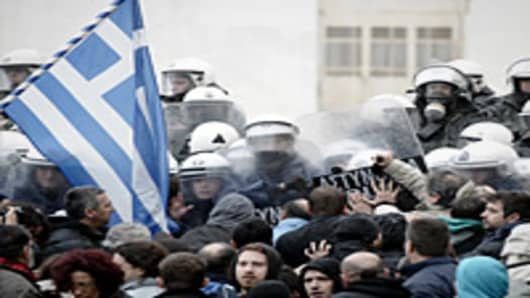Greek protesters burned German flags as thousands marched through the streets of Athens on Tuesday, according to CNBC staff on the ground. This could be seen as straightforward biting the hand that feeds.
The Greek media has joined in the criticism of the countries leading the bailout, with headlines screaming “Setting for [foreign] occupation” and “They are sending the state coffers abroad” (from the nationalist paper Avyi) as well as “Choking pressure from Merkel-Sarkozy” (daily paper Kathimerini).
As the euro zone’s largest economy, and one which has performed relatively well during the crisis, Germany has taken on the role of sharp-tongued nanny coming in to sort out squabbling children who have broken their toys in recent months – particularly as the upcoming French elections cast doubt over French President Nicolas Sarkozy’s continuing presence at the negotiating table.
The Greek protesters may seem like those recalcitrant children bridling at the thought of having their pocket money reduced.
Yet the austerity measures which have been proposed as part of the country’s second bailout by the troika of the International Monetary Fund, European Central Bank and European Union could have serious long-term consequences for the Greek economy.
German Chancellor Angela Merkel said she “will have no part in forcing Greece out of the euro."
"We don't do it to make things difficult for people, what would be our interest in doing that? But we want to reach a point where Greece can, with European help, live off its resources," Merkel said on Tuesday.
Germany's AdvantageSeveral leading economists have questioned the wisdom of Greece continuing in the euro if its economic growth is limited by austerity measures. There are continuing worries about the possibility of aGreek default on its debt repayments.
There are also whispers that weakness in Greece may benefit Germany in the short term, if the value of the euro is dampened.
“German exporters are having a huge advantage because of their association with Greece. It’s created more growth and therefore maybe they should be putting their hands in their pockets,” Jane Foley, Senior Currency Strategist, Rabobank, told CNBC Wednesday.
“Almost all of the German economic data this year has been better than expected, meaning that Germany could avoid recession.”
Still, German exports had their steepest fall in nearly three years in December according to data released Wednesday.
Some economists argue thatGermany should be encouraged to reduce its trade surplus, or raise wages to encourage German workers to spend, to help get the euro zone back on track.
German unit labor costs have remained steady in the past decade, as the cost of employing has risen elsewhere in the euro zone.
There have been objections to the bailout of less successful economies in Germany itself. German banks with exposure to Greek debt are facing a haircut in the value of the bonds they hold as part of the bailout package.



